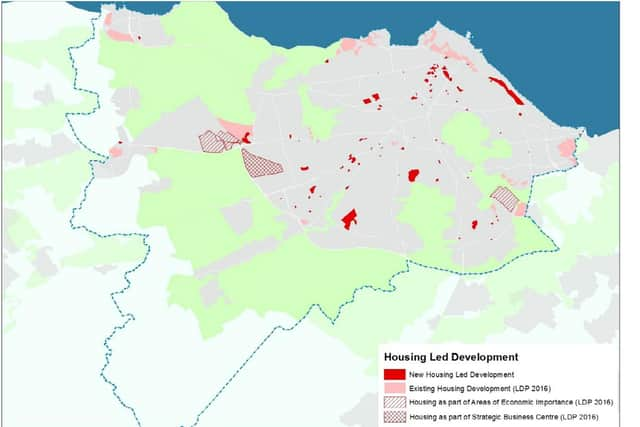Edinburgh City Plan: Ban on greenbelt development 'could cost 3,600 jobs' claims study
and live on Freeview channel 276
The proposed City Plan 2030, which serves as a blueprint for future development in the Capital, sets down that no new greenbelt land should be released for development in the next decade.
But economists at 4-Consulting say the plan would mean displacing as many as 400 businesses, with the land they currently occupy reallocated for housing. And they warn the council will use compulsory purchase orders if necessary.
Advertisement
Hide AdAdvertisement
Hide AdTheir study, commissioned by Holder Planning, says: “This is a radical intervention which is unprecedented as a concerted planning strategy anywhere in the UK. The potential economic and social consequences of the strategy do not appear to have been subject to any substantive assessment by the council.
"The plan risks leaving Edinburgh with its manufacturing sector accounting for the smallest share of the economy of any major city in the UK. Displaced activity across Edinburgh's industrial sites would translate into a loss of 3,600 jobs with a cumulative loss of around £2.6 billion to Edinburgh’s economy over ten years. The impacts are likely to be most pronounced in the more deprived areas of Edinburgh which are more reliant on the industrial and manufacturing jobs provided by the businesses which would be displaced."
The report claims the scale of the changes proposed will disrupt local business clusters and supply chains. And it says many of the businesses affected are long-established, local businesses working in a range of fields from logistics and engineering to services, skilled trades and manufacturing. It argues forcing them to move risks clearing working class communities of much-needed employment and income, as well as undermining the idea of 20-minute neighbourhoods.
The study acknowledges the council proposes the allocation of some employment space within residential-led developments, but it claims no work has been done on whether this would be a viable or attractive option for existing businesses.
Advertisement
Hide AdAdvertisement
Hide AdThe draft City Plan has been out for public consultation and the council’s planning committee is due to meet on November 30 to agree it before it goes to the Scottish Government for its consideration.


Robin Holder, of Holder Planning, said: “The publication of the proposed City Plan last year received a critical response from many in Edinburgh’s business community. Although the council is saying it is trying to tackle the city’s housing crisis, many experts believe that the plan’s strategy will not only fail to alleviate that problem, but also have profound consequences for the city’s economic and social make-up.
“Essentially the plan is to hollow out a significant proportion of the city’s blue collar employment base and replace it with high-density housing. There are 91 sites covering 145 hectares which are proposed for redevelopment in the City Plan and, extraordinarily, the council is proposing to compulsorily acquire sites from landowners if they do not co-operate. Most of the land is occupied by local employers and it is not clear that many have been directly approached by the council to discuss the proposals. Many may be unaware of their precarious future, and either cannot move or do not want to.
“The council will want to think very carefully about whether it should continue to promote the current strategy given the very negative socio-economic consequences identified by this appraisal. We can probably all agree that there should be a focus on developing under-utilised brownfield sites for much needed housing, but not at the expense of important local employers and sustainable communities."
Advertisement
Hide AdAdvertisement
Hide AdCity planning convener James Dalgleish said: “The draft City Plan 2030 requires that developments on business sites must provide new business space as part of mixed-use development across the city. All the comments made on the draft plan during the period of representations will be reported to the planning committee next month. Councillors will decide then on whether to submit the plan to Scottish Ministers to be considered by them.”